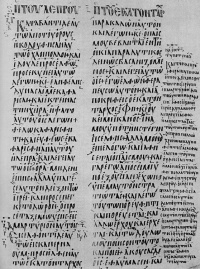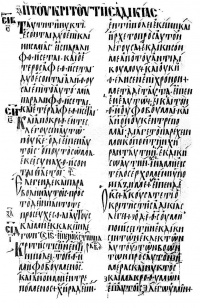Codex Vaticanus 354
From Textus Receptus
Codex Vaticanus, designated by S or 028 (in the Gregory-Aland numbering), ε 1027 (von Soden), formerly it was called Codex Guelpherbytanus, is a Greek manuscripts of the four Gospels which can be dated to a specific year instead of an estimated range. The colophon of the codex lists the date as 949 (on folio 234 verso). This manuscript is one of the four oldest New Testament manuscripts dated in this manner, and the only dated uncial.[1]
Contents |
Description
The codex contains 235 parchment leaves (36 cm by 24 cm), with complete text of the four Gospels. It was written in two columns per page, 27 lines per page,[2] 15-17 letters per line. Written in large, oblong, and compressed uncial letters.[3]
It contains Epistula ad Carpianum, lists of κεφαλαια, subscriptions, and stichoi. The Ammonian sections and the Eusebian Canons are given. It contains many later corrections (e.g. Luke 8:15), and margin notes (e.g. Matthew 27:16-17) predominantly added by later hand. It also includes neumes, and it is one of the oldest manuscript with neumes.[3] The writing is large oblong and compressed, and appears Slavic.
Luke 22:43-44, John 5:4, and Pericope Adultera (John 7:53-8:11) are marked by obelus as questionable textes.[3]
Text

The Greek text of this codex is a representative of the Byzantine text-type in close relationship to the codices Codex Mosquensis II, Codex Washingtonianus. Kurt Aland placed it in Category V.[2] It belongs to the textual family K1.
History
The name of the scribe was Michael, a monk, who finished his work "in the month of March, the fifth day, the sixt hour, the year 6457, the seventh indiction".[4]
The manuscript was described and collated by Bianchini[5] and collated with some errors by Birch in 1781-1783,[6] but collators in his day rarely noticed orthographical forms Tischendorf in 1866 corrected collation of Birch. Tischendorf states that facsimile of Bianchini was coarsely executed, he made another for himself.[3]
The codex currently is located in Rome (Bibl. Vat. Gr. 354).[2]
See also
References
- 1. Bruce M. Metzger, Bart D. Ehrman, The Text of the New Testament: Its Transmission, Corruption and Restoration, Oxford University Press, New York — Oxford 2005, p. 54.
- 2. Aland, Kurt and Barbara Aland, The Text of The New Testament: An Introduction to the Critical Editions and to the Theory and Practice of Modern Textual Criticism, 1995, Grand Rapids, Michigan, p. 113.
- 3. Gregory, Caspar René (1900). Textkritik des Neuen Testaments, Vol. 1. Leipzig. p. 65.
- 4. Bruce M. Metzger, Manuscripts of the Greek Bible: An Introduction to Greek Paleography, Oxford University Press, New York - Oxford, 1991, p. 110.
- 5. Bianchini, Evanqelium quadruplex, Rome 1749, Teil 1, Bd. 2, S.
- 6. Birch, Quatuor evangelia Graece, Kopenhagen 1788, S. III. IV, und Nachbildung, und Variae lectiones ad textum IV. evangeliorum. Kopenhagen 1801, S. Iv. V.
- 7. Scrivener, Frederick Henry Ambrose; Edward Miller (1894). A Plain Introduction to the Criticism of the New Testament, vol. 1. London: George Bell & Sons. p. 146.
Further reading
- G. Mercati, "Unframmento delle Ipotiposi di Clemente Alessandrino" (Studi e testi, 12; Rome, 1904).
- Bruce M. Metzger, "Manuscripts of the Greek Bible: An Introduction to Greek Paleography", Oxford University Press, New York - Oxford, 1991, p. 110.
External links
- Codex Vaticanus 354, S (028) at the Encyclopedia of Textual Criticism

